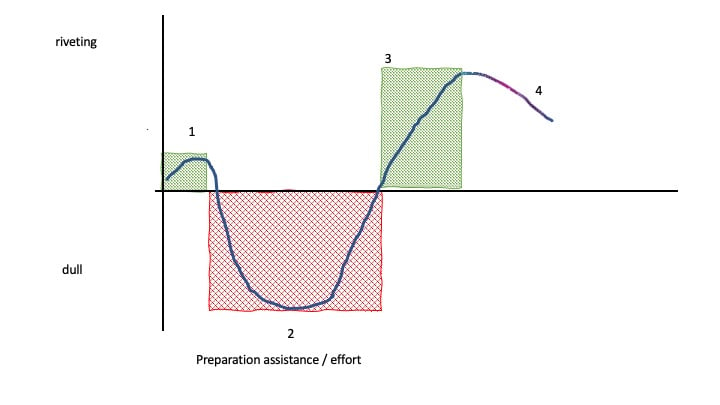HRTech
Delivering a compelling product presentation or panel discussion
I should be writing something about HRTECH today, but I got distracted.
I have had the pleasure and pain of watching 100s of product presentations and panels over the last 25 years. I've inflicted a fair number on audiences myself. I figured something out this morning on my walk in the hills above Heidelberg, and I would like share it with you. Let's call this the preparation paradox. I'm not the first person to figure this out.
My base assumption is that the person presenting has good knowledge of the topic they are presenting on.

There are four sorts of presentations, and alas, most of them are dull.
1. This is the presentation where you aren't really prepared. You stand up and talk based on what you know. You use your own words, and you don't have slides to support you. You rely on your expertise. Sometimes you crash and burn, and the lack of structure may mean you don't get all the points across you might have hoped too. But these aren't usually dull, either for the presenter or the audience.
2. This is the presentation where you have people helping you build the presentation. They research the audience, they write the slides for you, and they give you a script, and a tele-prompt text. The slides may well be beautiful. The script is full of glowing adjectives and lofty phrases, and it is all on message.
3. This is the presentation that you know so well, you know exactly what to say, you have learnt the script so well that becomes your own words. In essence you are acting out the script, you have internalised it. You know what jokes work well, and you know what slide is next, you have the timing nailed, and you can improvise a bit.
4. Eventually, you get bored, so delivery engagement declines. Presenting the same deck at 50 conferences will do that.
Most corporate presentations end up and stay in the trough of dullness. Almost all panel discussions are dull.
The problems in the corporate context
The person reading the script is not Patrick Stewart
At first the more help you have, the duller the presentation is. This is because you are reading stuff that someone else has written for you. Reading stuff out loud that you are reading for the second time yourself is always boring, your mind is focused on what word is next, and you have no cognitive capacity left to engage with audience.
The person writing the script is not Shakespeare
The person writing the stuff tries their best to add excitement to the text, but SaaS isn't meeting Klingons for the first time, or deciding whether to kill Caesar or not. This is made worse when the script writer and the presenter don't have the same home language, or are from different sides of the Atlantic. Tip: leave baseball metaphors to those that play the game.
Doing it well
The time it takes for an executive to internalise a presentation to the point where they can move from zone 2 to zone 3 varies, so you would expect that the better presenters are able to spend less time preparing. The funny thing though, is that they don't. They are the ones who stay longer to practice it.
The best presenter I've experienced in the corporate context was Les Hayman. His presentations sparkled, audiences would laugh and learn at the same time. At first, I thought it was because he ad-libbed it (like a corporate Just a minute), and he was simply naturally gifted.
As I got to know Les, I discovered that he practised and practised. He built a repertoire of jokes and metaphors, and he would test them in small event, but rarely ad-libbed when presenting to a key event. Les is no longer with us, but I found his blog post about giving great presentations. It made me smile. Here an excerpt.
Don’t write your whole speech down and then read it out as this will generally come across as being dry and lifeless, even if you use a teleprompter.
Better to know what you are going to say, and after practice, practice, practice write bullet points and prompts on some small cards that are easily carried and scanned if needed.
If you are going to tell a personal story, there is no need to write the whole thing down. “Tell them about breaking my leg” is more than enough to remind you. Practice the whole speech many times from beginning to end. This will not only make you familiar with what you want to say, but will also show you how long it will take
Les has a second post about speeches. Also worth a read. I found a speech of his here.
One comment he made about presenting stuck with me. He said slides are to presenting as running shoes are to a marathon runner. You can buy the best shoes, but you have to put in the preparation work.
I'm speaking next week at the Heidelberg Product Tank, so I had better get practising.




